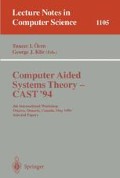Abstract
The paper points out the importance of systems technology for dealing with complex design tasks in real life problem solving especially in the field of engineering.
After an introduction, where Systems Science and Systems Technology are generally discussed the general framework of Design Science and related Design Technologies are considered.
For the definition of “Systems Technology” the concept of the Design Propeller is used. This is followed by the discussion of CAD tools for dealing with problems on systems level. The specific roles of “Computer Aided Systems Theory”, “Computer Aided Engineering” and “Computer Aided Manufacturing” in the context of “Computer Aided Systems Technology” (CAST) are pointed out.
Future perspectives of necessary CAST research for applications in the “Engineering of Computer Based Systems” (ECBS) and in the development of “Application Specific Intelligent Micro Systems” (ASIMS) are given.
Preview
Unable to display preview. Download preview PDF.
References
Pichler, F., R. Moreno-Díaz (eds.): Computer Aided Systems Theory: EUROCAST'89, Lecture Notes in Computer Science 410, Springer Verlag, Berlin, 1990
Pichler, F., R. Moreno-Díaz (eds.): Computer Aided Systems Theory: EUROCAST'91, Lecture Notes in Computer Science 585, Springer Verlag, Berlin, 1992
Pichler, F., R. Moreno-Díaz (eds.): Computer Aided Systems Theory: EUROCAST'93, Lecture Notes in Computer Science 763, Springer Verlag, Berlin, 1994
Thomé, Bernhard (ed.): Systems Engineering: Principles and Practice of Computer based Systems Engineering John Wiley & Sons, Chichester 1993
Kronlöf, Klaus (ed.): Method Integration: Concepts and Case Studies John Wiley & Sons, Chichester 1993
Schefström, D. and G. van den Broek (eds.): Tool Integration: Environments and Frameworks John Wiley & Sons, Chichester 1993
Thomé, Bernhard (ed.): Task Force on Computer-Based Systems Engineering-Newsletter IEEE Computer Society, Vol 1, No 1, Summer 1993
Thomé, Bernhard (ed.): Task Force on Engineering of Computer-Based Systems-Newsletter IEEE Computer Society, Vol 1, No 2, Winter 1993
Geiger, M.: CAST.FSM Applied to VLSI Synthesis: Experimental Results and Requirements for Industrial Use in: Computer Aided Systems Theory: EUROCAST'91, Lecture Notes in Computer Science 585, Springer Verlag, Berlin, 1992, pp. 422–441
Müller-Wipperfürth, T., J. Scharinger, F. Pichler: FSM Shift Register Realization for Improved Testability in: Computer Aided Systems Theory: EUROCAST'93, Lecture Notes in Computer Science 763, Springer Verlag, Berlin, 1994, pp. 254–267
Müller-Wipperfürth, T.: On the integration of CAST.FSM into the VLSI design process Lecture presented at CAST'94: Fourth International Workshop on Computer Aided Systems Technology, University of Ottawa, May 16–20, 1994 (General Chairman: Prof. Tuncer I. Ören)
Pichler, F., H. Schwärtzel (eds.): CAST Methods in Modelling Springer Verlag, Berlin, 1992
Pichler, F., H. Schwärtzel: CAST — Computerunterstützte Systemtheorie Springer Verlag Berlin, 1990
Gajski, D., H. Kuhn: Guest Editors Introduction, New VLSI Tools IEEE Computer, vol. 16, no.12, pp. 11–14, 1983
De Man, Hugo: Microsystems: A challenge for CAD Development. in: MICROSYSTEM Technologies 90 (H. Reichl (ed.).) Springer Verlag Berlin, 1990, pp. 3–8.
Müller-Glaser, K.D., H. Rauch, W. Wolz, J. Bortolazzi, C. Kuntzsch, R. Zippelius: A Specification Environment for Microsystems Design. in: MICROSYSTEM Technologies 90 (H. Reichl (ed.).) Springer Verlag Berlin, 1990, pp. 9–16
Michel, P., U. Lauther, R. Duzy (eds.): The Synthesis Approach to Digital System Design Kluwer Academic Publishers, Boston, 1992
Author information
Authors and Affiliations
Editor information
Rights and permissions
Copyright information
© 1996 Springer-Verlag Berlin Heidelberg
About this paper
Cite this paper
Pichler, F., Schwärtzel, H., Moreno-Diaz, R. (1996). Systems Science and systems technology: From conceptual frameworks to applicable solutions. In: Klir, G.J., Ören, T.I. (eds) Computer Aided Systems Theory — CAST '94. Lecture Notes in Computer Science, vol 1105. Springer, Berlin, Heidelberg. https://doi.org/10.1007/3-540-61478-8_63
Download citation
DOI: https://doi.org/10.1007/3-540-61478-8_63
Published:
Publisher Name: Springer, Berlin, Heidelberg
Print ISBN: 978-3-540-61478-4
Online ISBN: 978-3-540-68600-2
eBook Packages: Springer Book Archive

